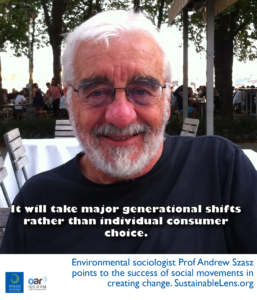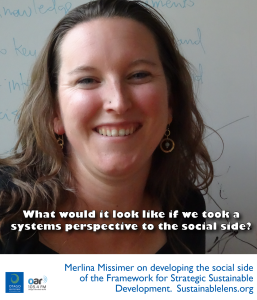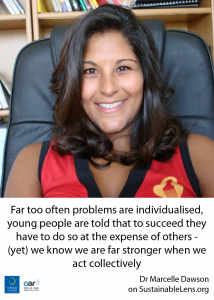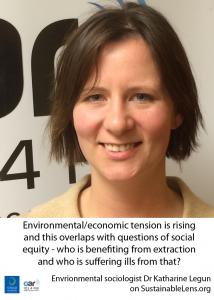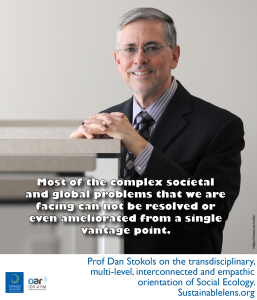
The value of interdisciplinarity is that most of the complex societal and global problems that we are facing can not be resolved or even ameliorated from a single vantage point.
Professor Dan Stokols is Chancellor’s Professor Emeritus in University of California Irvine’s School of Social Ecology. We talk about the transdisciplinary, multi-level, and empathic nature of Social Ecology.
Talking points
Expose students to many vantage points, and teach them how to connect those different analytic perspectives
Three legged stool we were founding our programme on, first the ecological paradigm with all its conceptual and methodological implications – that is you look at problems from a very broad contextual perspective at different levels of analysis from gnomic to societal or global; the second leg is interdisciplinarity, we were committed to training students in an explicitly interdisciplinary way – so that when they framed problems they would not embrace the orthodoxy of one particular field or one level of analysis, but they would be flexible and able to move across different levels and be receptive to different disciplinary points of view; and the third leg of the school was application to policy and community intervention – what today is called translation to practice, translating scientific knowledge into practical strategies to improve the world.
The value of interdisciplinarity is that most of the complex societal and global problems that we are facing can not be resolved or even ameliorated from a single vantage point. They are complex, they have multiple origins or causes, they manifest at different levels, from individual organisational levels to community and societal levels. So to tackle those kinds of problems, it is important for students, researchers, practitioners to bring a broad multi-level, cross-disciplinary perspective where they’re able to span and integrate a lot of different fields. Now, there are some problems in science and society that can be solved quite nicely by disciplinary specialisation…for example vaccine development…but the social ecology comes in when you can have a wonderful new technology developed by one field…but when it needs to be integrated into society you need a broader model for how to facilitate that.
If we want to cultivate a transdisciplinary orientation in a student or a scholar, there are certain values that underlie that orientation – for example inclusive, being tolerant of other perspectives, not rejecting things that are different or foreign to what you are used to things about. Also there are attitudes and beliefs. If people believe that it’s way too time intensive to do interdisciplinary work, and they can be more effective working individually on smaller and more focussed problems, then that’s an attitude that will make it difficult for them to thrive in a large cross-disciplinary team environment. Then there are behaviours that reflective of a transdisciplinary orientation – such as reading material outside your main field of training, or going to conferences outside your main field, or getting together often with colleagues from different fields to integrate and share ideas. Finally, there is a conceptual or analytic stance – how people frame problems. What we try to focus on in social ecology is how would we train a student to think systemically, to look at the multiple levels of a problem – to be able to traverse those and be adept at doing that. How would we train them to think ecologically, so that they see that a problem is science or society may have roots in biological processes, in material geographic properties, it may be an economic phenomena…in other words the roots of complex problems may lie in several different fields.
Wicked problems are vexing because there are no easy clear solutions to them.
One of the attributes of wicked problems is that they are so intertwined with other problems, in other words, you cant identify the core wicked problem, but it’s wicked because it cross penetrates other problems that are related to it. Rather than taking a reductionist approach to a wicked problem it seems that the only hope to getting a sense of the multiple roots and manifestations is thinking more broadly – it’s patterns of wickedness, the ways in which different problems are synergistic that becomes vexing.
Climate change is pretty wicked…I don’t know whether the behavioural potential is sufficient to get us out of this predicament
Psychology in an age of crisis.
We’re going to need behavioural and social innovation for greater sophistication.
As humans we haven’t been very good at curbing some of those destructive impulses.
People get overwhelmed by the enormity of the environmental and social problems we’re facing. They see not only occasional references to these things, but through the internet and multimedia they’re seeing tsunamis and the terrible destruction that they can cause, real time. They’re seeing terrorism, and the aftermath of terrorism, and war and brutality, we’ve become so immersed in media coverage of these problems that it’s easy to become overwhelmed and feel that there’s nothing an individual can to try to be more sustainable, to try to promote civility…a learned helplessness in thinking about global problems.
We are in an age of crisis and psychology is important in trying to understand what are the bases for people’s tendency to give up on these problems, and how can we reverse those tendencies and get people more engaged in a collective active effort to stem those problems?
There’s a certain amount of defensive neglecting – trying to get problems such as climate change out of our awareness because they are just too disconcerting to think about them.
Whether we can reach Anthropocene 2.0 and pull that off, is anybody’s question.
We’re all in this together, no matter what area of the globe we live, but humans haven’t proven themselves to be very effective at political cooperation across borders. Our social limitations are just as important to address as our technological limitations.
Slow collapse suggests processes are happening so gradually, an almost invisible way, and yet there are tipping points where processes accelerate very rapidly
Social ecology in the curriculum – a missing systemic view of the world, we need to broaden the curricula. we need students to think broadly about the environment, and the way that different phenomena are interrelated, rather than encouraged too early to pursue a narrow curricula box.
We need to enable students to think in more innovative and broad ways about the world around us.
Social problems…high school students should be exposed to some of the underpinnings of violence – racism, poverty…
People in the top 1% of income bracket – global change may not seem as threatening. They may feel that they are insulated from it – they can always go to higher ground, or more luxurious ground, buy the water the need. But in fact, we’re all so interconnected that it’s really a mirage. A mirage for affluent people to think that way. The whole infrastructure is something they’re dependent on and if that collapses, they’re just as vulnerable. Certainly the poor are more vulnerable, they don’t have the buffers of income and affluence, but ultimately even the 1% need to take into account the protection of the earth’s ecosystems and equality.
Sustainability: many different definitions…one definition concerns preservation of resources for future generations so that the current generation doesn’t over consume…a quantitative assessment of the resources we have against global footprint of the current generation. Other definitions embrace the idea of equity and equability – sustainability for whom? for which groups? what’s being sustained? Many definitions prioritise the idea that sustainability preserves and takes care of the most vulnerable in society, whether that be be women, or people living in poverty, or minority groups often suffering from prejudice. So a combination of resource management and fairness, distributive justice and fairness.
(Intergenerational equity) a kind of visioning process, whereby imagined or projected needs of that population, those future generations are brought to the table.
As our world population grows fairly soon at 10 or 11 billion people, what would it feel to be living on a hotter, drier planet with so many more mouths to feed? How can we crack some of those challenges. So in some ways, our decisions need to be made as if we are already there. How would those more severe constraints shape our decisions?
I’m at times an optimist, at other times I’m less optimistic when I see the capacity of people to hurt each other. That bothers me because the climate change is going to require cooperation, some altruism. It’s going to require empathy. I would like to see more of that in the world.
We have to get our social and behavioural house in order before before we have a prayer of effectively tackling the environmental and technological problems we’re facing today.
(Success?) I really value my teaching. I value my research too, but when I see students in my classroom getting excited about ideas, and they leave a course wanting to do some good things in the world – that for me is a momentum for changing the world.
(Activist?) There are ways that I have been activist, in working to translate some of the research that I’ve done into guidelines for improved policy, public health. As far as environmental movements or at the frontlines of those, I haven’t been as active that way, but I’ve tried to be at the interface of research and scholarship, and the translation of some that into strategies that might improve public health, or urban design or environmental management
(Motivation?) Joy in my family. building a non-traditional interdisciplinary unit. Thinking freely.
(Challenges?) Working on a book on principles of social ecological analysis. Continuing my research into understanding the circumstances that enable cross-disciplinary teams to work effectively together to create integrate knowledge, to create transdisciplinary innovations that have a positive effect on society.
(Miracle?) I’d love to see major illnesses cured. Effects of global climate change reversed. I’d like to see more peace in the world, and less conflict, war and posturing in ways that have potential to create havoc.
(Advice?) If we to have any hope of resolving some of the problems we’ve been talking about at global level, it’s going to require individuals thinking broadly, acting cooperatively with each other, giving each other the benefit of the doubt – rather than being too judgemental or quick to criticise – I do think that so many of our problems are rooted in this proclivity for conflict and competition. So think as broadly as possible, give fellow humans the benefit of the doubt – everyone’s having a challenging existential existence, trying to get through their day so if we could all support each other that would be very valuable.
This Sustainable Lens is from a series of conversations at University California Irvine. Sam’s visit was supported by the Newkirk Center for Science and Society, and coincided with Limits 2015.


